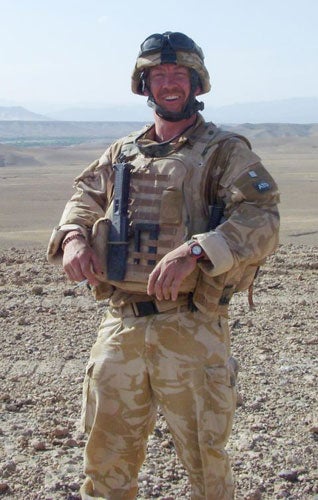George Medal winner killed in Helmand was father of four

Your support helps us to tell the story
From reproductive rights to climate change to Big Tech, The Independent is on the ground when the story is developing. Whether it's investigating the financials of Elon Musk's pro-Trump PAC or producing our latest documentary, 'The A Word', which shines a light on the American women fighting for reproductive rights, we know how important it is to parse out the facts from the messaging.
At such a critical moment in US history, we need reporters on the ground. Your donation allows us to keep sending journalists to speak to both sides of the story.
The Independent is trusted by Americans across the entire political spectrum. And unlike many other quality news outlets, we choose not to lock Americans out of our reporting and analysis with paywalls. We believe quality journalism should be available to everyone, paid for by those who can afford it.
Your support makes all the difference.The first British bomb disposal expert to be killed in Afghanistan has raised the total number of British fatalities in the conflict to 118. Warrant officer Class 2 Gary O'Donnell, the holder of a George Medal for his courageous actions while serving in Iraq two years ago, died on Thursday when a roadside bomb he was on his way to defuse exploded.
WO2 O'Donnell, 40, from Edinburgh, was killed just nine weeks after the birth of his fourth child, Ben. He had spoken recently about his highly dangerous work to The Independent.
He described how he had escaped death in southern Afghanistan by jamming his fingers into a clothes peg milliseconds before it slammed shut and detonated a roadside bomb.
He said he was crouching over a Taliban bomb in Helmand, trying to defuse it, when he spotted the crude wooden trigger slamming shut. He said: "It happened almost straight away. I just saw it slipping and jammed my fingers in."
A team from the Royal Logistics Corps' elite bomb disposal unit had raced to the scene after soldiers from 2nd Battalion, The Parachute Regiment discovered the deadly device buried in a track in the desert, close to their camp in Kajaki.
"The device had a pressure plate," WO2 O'Donnell said. "But not like the ones we normally see. The circuit was being held open by what looked like a large clothes peg."
The bomb was wired to explode when a soldier's weight pushed the peg shut, forcing two metal contacts together. The contacts were made from strips of tin wrapped around the ends of the wooden pegs. A length of black rubber, possibly from an inner tube, was wrapped around the opposite end of the device, holding them open. But as soon as WO2 O'Donnell began brushing the earth away to take a closer look, the elastic band slipped and the contacts came crashing towards each other.
"I was clearing the surface ground from above the switch and the rubber started unwinding" he said. "I didn't really have time to think, I just had to jam my fingers into the switch. If I hadn't done it, if it had shut, we wouldn't be having this conversation."
The clothes peg was wired to an 82mm high-explosive mortar and a 107mm Chinese rocket. Between them they have more than 2kg of explosive charge.
Normally the bomb disposal soldiers use a remote- controlled razor blade to cut the wires, while they take cover in case the device is booby trapped with a secondary circuit. But WO2 O'Donnell was trapped with his fingers inside the trigger, and he couldn't get away without detonating the explosives.
To make matters worse, he wasn't wearing a protective bomb suit, like soldiers in Britain often use to give them extra protection from a blast. The massive, unwieldy suits weigh 45kg and they make it difficult for the soldiers to defend themselves if they get attacked en route to a bomb site.
In a single day, WO2 O'Donnell had to defuse eight Taliban bombs on a hill overlooking Helmand's deadly green zone, near Gereshk. The insurgents have started targeting high ground with record numbers of massive improvised explosive devices, because they know it is where the tanks and armoured cars go to provide back-up for soldiers in the valley below.
The Taliban are using teams of trained bomb- makers to manufacture bigger and deadlier bombs in secret locations across the province. "You have got to have a lot of respect, not only for the enemy, but also for their bombs," WO2 O'Donnell said.
He leaves four children: newborn Ben, Aiden, eight, and two children from a previous marriage, Dylan, 16, and Kayleigh, 14.
His widow, Toni, said: "Gary was living the dream and we are all very proud of who he was and he will be missed greatly."
His commanding officer, Dave Wilson, said men of WO2 O'Donnell's calibre were "extremely rare" and that his death would be a "great loss to the bomb disposal community and the Army ... He was at the very top of his extremely dangerous and difficult trade. It was a trade at which he excelled."
* A soldier from the 2nd Battalion the Parachute Regiment has been killed in a firefight with enemy forces in Afghanistan, the Ministry of Defence said last night. The soldier was part of a routine patrol in Helmand Province which encountered Taliban forces yesterday morning.
In the ensuing firefight the 2 Para soldier was shot in the head and killed instantly, an MoD spokesman said. Next-of-kin have been informed.
Join our commenting forum
Join thought-provoking conversations, follow other Independent readers and see their replies
Comments